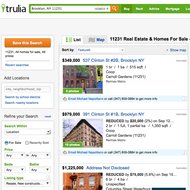Regulators, prosecutors, investors and insurers have filed dozens of new claims against Bank of America, JPMorgan Chase, Wells Fargo, Citigroup and others, related to more than $1 trillion worth of securities backed by residential mortgages.
Estimates of potential costs from these cases vary widely, but some in the banking industry fear they could reach $300 billion if the institutions lose all of the litigation. Depending on the final price tag, the costs could lower profits and slow the economic recovery by weakening the banks’ ability to lend just as the housing market is showing signs of life.
The banks are battling on three fronts: with prosecutors who accuse them of fraud, with regulators who claim that they duped investors into buying bad mortgage securities, and with investors seeking to force them to buy back the soured loans.
“We are at an all-time high for this mortgage litigation,” said Christopher J. Willis, a lawyer with Ballard Spahr, which handles securities and consumer litigation.
Efforts by the banks to limit their losses could depend on the outcome of one of the highest-stakes lawsuits to date — the $200 billion case that the Federal Housing Finance Agency, which oversees the housing twins Fannie Mae and Freddie Mac, filed against 17 banks last year, claiming that they duped the mortgage finance giants into buying shaky securities.
Last month, lawyers for some of the nation’s largest banks descended on a federal appeals court in Manhattan to make their case that the agency had waited too long to sue. A favorable ruling could overturn a decision by Judge Denise L. Cote, who is presiding over the litigation and has so far rejected virtually every defense raised by the banks, and would be cheered in bank boardrooms. It could also allow the banks to avoid federal housing regulators’ claims.
At the same time, though, some major banks are hoping to reach a broad settlement with housing agency officials, according to several people with knowledge of the talks. Although the negotiations are at a very tentative stage, the banks are broaching a potential cease-fire.
As the housing market and the nation’s economy slowly recover from the 2008 financial crisis, Wall Street is vulnerable on several fronts, including tighter regulations assembled in the aftermath of the crisis and continuing investigations into possible rigging of a major international interest rate. But the mortgage lawsuits could be the most devastating and expensive threat, bank analysts say.
“All of Wall Street has essentially refused to deal with the real costs of the litigation that they are up against,” said Christopher Whalen, a senior managing director at Tangent Capital Partners. “The real price tag is terrifying.”
Anticipating painful costs from mortgage litigation, the five major sellers of mortgage-backed securities set aside $22.5 billion as of June 30 just to cushion themselves against demands that they repurchase soured loans from trusts, according to an analysis by Natoma Partners.
But in the most extreme situation, the litigation could empty even more well-stocked reserves and weigh down profits as the banks are forced to pay penance for the subprime housing crisis, according to several senior officials in the industry.
There is no industrywide tally of how much banks have paid since the financial crisis to put the mortgage litigation behind them, but analysts say that future settlements will dwarf the payouts so far. That is because banks, for the most part, have settled only a small fraction of the lawsuits against them.
JPMorgan Chase and Credit Suisse, for example, agreed last month to settle mortgage securities cases with the Securities and Exchange Commission for $417 million, but still face billions of dollars in outstanding claims.
Bank of America is in the most precarious position, analysts say, in part because of its acquisition of the troubled subprime lender Countrywide Financial.
Last year, Bank of America paid $2.5 billion to repurchase troubled mortgages from Fannie Mae and Freddie Mac, and $1.6 billion to Assured Guaranty, which insured the shaky mortgage bonds.
But in October, federal prosecutors in New York accused the bank of perpetrating a fraud through Countrywide by churning out loans at such a fast pace that controls were largely ignored. A settlement in that case could reach well beyond $1 billion because the Justice Department sued the bank under a law that could allow roughly triple the damages incurred by taxpayers.
Bank of America’s attempts to resolve some mortgage litigation with an umbrella settlement have stalled. In June 2011, the bank agreed to pay $8.5 billion to appease investors, including the Federal Reserve Bank of New York and Pimco, that lost billions of dollars when the mortgage securities assembled by the bank went bad. But the settlement is in limbo after being challenged by investors. Kathy D. Patrick, the lawyer representing investors, has said she will set her sights on Morgan Stanley and Wells Fargo next.
Article source: http://www.nytimes.com/2012/12/10/business/banks-face-a-huge-reckoning-in-the-mortgage-mess.html?partner=rss&emc=rss
